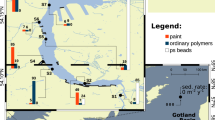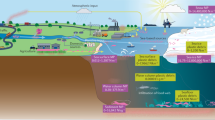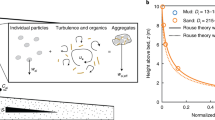Abstract
EROSION and transportation of sediment by organic agents is a well-known phenomenon, and sediment transport is known to occur over large areas in many parts of the world1. However, the best-known examples of organic transportation are confined almost exclusively to coarse-grained sediments. We know of no well-substantiated examples of transport of sediment finer than coarse sand over distances greater than a few centimetres.
This is a preview of subscription content, access via your institution
Access options
Subscribe to this journal
Receive 51 print issues and online access
$199.00 per year
only $3.90 per issue
Buy this article
- Purchase on Springer Link
- Instant access to full article PDF
Prices may be subject to local taxes which are calculated during checkout
Similar content being viewed by others
References
Emery, K. O., in The Sea, edit. by Hill, M. N., 3, 776 (Interscience, New York and London, 1963).
Linder, E., Proc. Geol. Assoc., 51, 283 (1940).
Author information
Authors and Affiliations
Rights and permissions
About this article
Cite this article
SHELDON, R., WARREN, P. Transport of Sediment by Crustaceans and Fish. Nature 210, 1171–1172 (1966). https://doi.org/10.1038/2101171a0
Issue Date:
DOI: https://doi.org/10.1038/2101171a0
Comments
By submitting a comment you agree to abide by our Terms and Community Guidelines. If you find something abusive or that does not comply with our terms or guidelines please flag it as inappropriate.



